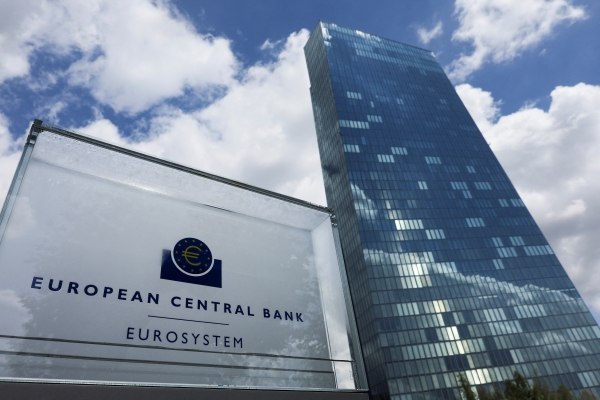 Signage is seen outside the European Central Bank (ECB) building, in Frankfurt, Germany 21 July 2022.;
Credit: Wolfgang Rattay / Reuters
Signage is seen outside the European Central Bank (ECB) building, in Frankfurt, Germany 21 July 2022.;
Credit: Wolfgang Rattay / Reuters
The European Central Bank (ECB) raised its key interest rates by an unprecedented 75 basis points on Thursday 8 September 2022 and promised further hikes, prioritising the fight against inflation even as the bloc is likely heading towards a winter recession and gas rationing.
With inflation at a half-century high and approaching double-digit territory, policymakers are worried that rapid price growth is getting entrenched, melting away household savings, thwarting investment and setting off a hard-to-break wage-price spiral.
Following up on a large July rate hike, the ECB raised its deposit rate to 0.75% from zero and lifted its main refinancing rate to 1.25%, the highest level for both since 2011, with moves promised for the next several meetings.
Still, the ECB is trailing many of its peers, particularly the US Federal Reserve, in raising interest rates and some analysts see the oversized steps since July as an attempt to catch up.
"We expect to raise interest rates further, because inflation remains far too high and is likely to stay above our target for an extended period," ECB chief Christine Lagarde said, adding that Thursday's decision was unanimous.
"We think it will take several meetings," she said. "How many is several? It’s probably more than two, including this one, but it’s probably also going to be less than five," Lagarde said, suggesting that rate hikes could continue into early 2023.
Policymakers had for weeks oscillated between a 50 and a 75 basis-point increase, but another jump in both headline and underlying inflation likely settled the debate with Lagarde repeatedly arguing that the current high level was simply unacceptable.
When asked about future moves, Lagarde said 75 basis points is not the norm and future moves could be smaller but she also declined to rule out a similarly large move in the future.
"We continue to expect it to raise its deposit rate to 1.75% by the beginning of next year, but to pause the rate hike process after that because of the recession that will then be visible," Commerzbank economist Jörg Krämer said.
"To put a lasting brake on inflation, the ECB would even have to go beyond that, because inflation is massively above its target," Krämer added.
Inflation jumped to 9.1% in August and the ECB's new projections predict a peak near this level just before the end of the year, even if some market analysts see it over 10% soon.
Still, these projections put price growth over the bank's 2% target for years to come with the 2023 projection raised to 5.5% from 3.5% and 2024 seen at 2.3%, above the 2% target.
Markets, which saw Thursday's move as very likely, now price a little more than a 50 basis-point interest rate increase for October and a similar hike in December.
"Where we are is not the neutral rate," Lagarde said. "We are heading in that direction. It takes frontloading. It will take further hikes in the next several meetings."
The ECB's growth projections, sharply cut for next year, expect economic stagnation over the winter months but many of the potential downside risks, particularly the loss of Russian gas, has already materialised.
"We see today's decision in favour of the larger step as a signal to markets that the central bank is serious about regaining its inflation-fighting credentials and that it is willing to accept costs in terms of lower growth to ensure price stability," Morgan Stanley said in a note.
In the ECB's baseline scenario, the economy would expand by 0.9% next year while in the downside, it could shrink by 0.9%.
This downside scenario would, however, push inflation even higher, to 2.7% in 2024 as the drag from an economic downturn would be far outweighed by persistently high natural gas prices.
The euro's weakness may have also been a consideration on Thursday.
The euro has been languishing around parity against the dollar for weeks and its sharp fall to two-decade lows this year adds to import costs and raises inflation.
Lagarde added that while running down its oversized balance sheet, as done by some of its peers, could be on the agenda at one point, it is for now concentrating on interest rates as an instrument.









